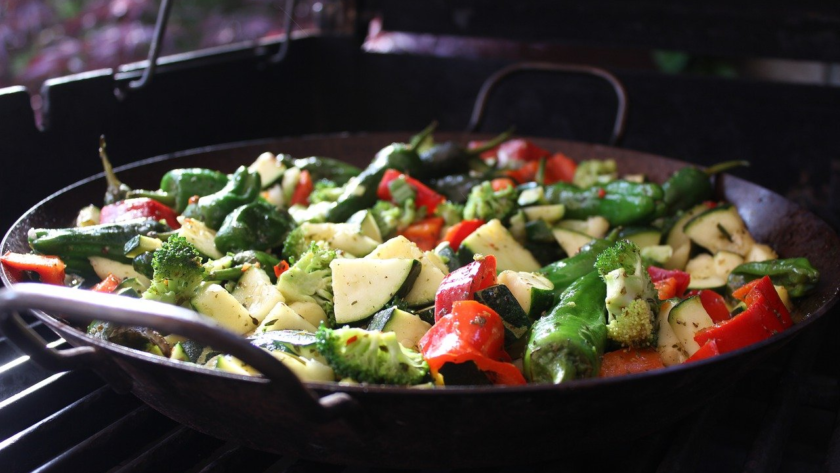Have you ever taken a bite of zucchini and been met with an unpleasant, bitter taste? It’s not uncommon for zucchini to have a bitter flavor, especially if it’s overripe or has been stored improperly. But the question remains: is it safe to eat bitter zucchini?
As an AI language model, I don’t have taste buds, but I understand that bitterness can be a major turnoff for many people. However, the good news is that eating bitter zucchini is generally safe as long as it’s not too old or moldy. In fact, some people even enjoy the slightly bitter taste of zucchini as it can add complexity to certain dishes.
But if you’re still unsure about whether or not to eat your bitter zucchini, read on for more information about its safety and tips on how to prevent bitterness in the first place.
Key Takeaways
- Bitterness in zucchini is caused by cucurbitacin, a natural compound that serves as a defense mechanism for the plant against pests and diseases.
- Eating bitter zucchini is generally safe as long as it’s not too old or moldy, but some people may be more sensitive to the toxins and experience adverse reactions.
- Proper harvesting, storage, and handling techniques can help prevent bitterness in zucchini, as well as choosing the right variety and using cooking methods like roasting or grilling.
- Bitter zucchini can add a unique flavor profile to dishes and can be incorporated into sauces, stews, or pickling/marinating vegetables, and can handle bold flavors like cumin or smoked paprika.
Understanding Bitterness in Zucchini
It’s important to understand the cause of bitterness in zucchini before deciding if it’s safe to eat. Bitterness in zucchini is caused by cucurbitacin, a compound that naturally occurs in the plant. This compound can make the zucchini taste unpleasantly bitter, and it can be particularly concentrated near the stem and seeds.
While some may find the bitterness off-putting, others actually seek out bitter zucchinis for certain culinary uses. For example, it can add a unique flavor profile when pickling or marinating vegetables.
However, if you’re not intentionally seeking out bitter zucchinis for these purposes, it’s generally recommended to avoid them as they can cause digestive issues such as nausea and vomiting.
Is Bitter Zucchini Safe to Eat?
You might want to reconsider biting into that zucchini – there’s a catch that could leave a bad taste in your mouth. While bitter zucchinis are generally safe for consumption, they can pose some risks.
The bitterness in zucchini is caused by cucurbitacins, which are natural toxins found in the squash family. These toxins serve as a defense mechanism for the plant against pests and diseases.
Eating too much of these cucurbitacins can cause nausea, vomiting, and diarrhea. In extreme cases, it can even lead to food poisoning. However, the health effects of bitterness in zucchinis vary from person to person.
Some people may be more sensitive to these toxins than others and may experience adverse reactions with just a small amount of bitter zucchini. It’s best to err on the side of caution when consuming this vegetable and avoid eating it if it tastes extremely bitter or unpleasant.
Tips for Preventing Bitterness
Hey there! When it comes to preventing bitterness in zucchini, we’ve found that there are a few key factors to keep in mind.
First off, harvesting at the right time is crucial – if you let your zucchini grow too large, it’s more likely to develop a bitter taste.
Additionally, proper storage and handling can go a long way towards preserving the flavor of your zucchini. And finally, soil and environmental factors can also play a role – for example, over-fertilization or inconsistent watering may lead to bitterness.
Let’s dive into these tips in more detail!
Harvesting at the Right Time
When picking zucchini, make sure they’re still small and tender to avoid the bitter taste that comes with overripe vegetables. The optimum ripeness for zucchinis is when they’re about 6-8 inches long, and their skins are still shiny and smooth.
When harvesting early, you’ll also be able to tell whether or not the vegetable is ready by gently pressing your finger on its skin – if it leaves an indentation, then it’s not yet ripe. Another way to determine the right time to harvest zucchinis is by checking their color.
Early harvests typically have a bright green color with no signs of yellowing or browning. If a zucchini has started turning yellow or brown, then it has become too mature and may already have a bitter taste. By following these tips for harvesting at the right time, you can ensure that your zucchinis are sweet and tasty every time you cook them!
Proper Storage and Handling
Properly storing and handling your zucchinis is crucial to keeping them fresh and delicious for longer periods of time. Temperature control is key when it comes to storing zucchinis, as they’re sensitive to both heat and cold.
Ideally, you should store your zucchinis in a cool place that’s between 32°F (0°C) and 40°F (4°C). If you don’t have access to a refrigerator or cooler, the next best option would be to store them in a basement or pantry that stays relatively cool.
Moisture management is another important factor to consider when it comes to storing zucchinis. Too much moisture can cause them to spoil quickly, while too little moisture can result in shriveled up zucchinis that are no longer appetizing.
To strike the right balance, wrap your zucchinis in paper towels before placing them in an airtight container. This will help absorb any excess moisture while also providing some protection from air exposure.
By following these simple tips for temperature control and moisture management, you can enjoy fresh and tasty zucchinis for weeks on end!
Soil and Environmental Factors
To ensure the best quality of your zucchinis, you should be aware of the soil and environmental factors that can affect their growth.
The composition of the soil plays a crucial role in determining the taste and texture of your zucchinis. Zucchinis grow best in well-drained soil with a pH range between 6 and 7.5. Soil that’s too acidic or alkaline can negatively affect the growth and development of your zucchinis, resulting in bitter-tasting vegetables.
Another factor to consider when growing zucchinis is climate. Zucchinis thrive in warm weather conditions with a temperature range between 70°F to 90°F. If temperatures fall below this range, it may cause stunted growth or even death of your plant.
Excessive rainfall or humidity can lead to fungal diseases that affect the health and quality of your zucchini crop. Proper watering techniques are important for zucchini growth, as inconsistent or inadequate watering can lead to stunted growth and poor quality produce. It’s best to water deeply once or twice a week, rather than frequent shallow watering. Additionally, mulching around the plants can help retain moisture in the soil.
By being mindful of these soil and environmental factors, you can ensure a bountiful harvest of delicious, non-bitter zucchinis for all your culinary needs!
How to Remove Bitterness
If you’re looking to get rid of the bitter taste in zucchini, try soaking it in saltwater for a few minutes before cooking. This simple and effective method helps remove excess moisture from the zucchini, which is one of the main culprits behind its bitterness.
To do this, simply dissolve some salt in water and then soak your sliced or diced zucchini in the solution for about 10-15 minutes. Afterwards, rinse them off with cold water and pat dry before using them in your recipe.
But if you’re still finding zucchinis to be too bitter, there are other cooking methods that can help. For example, roasting or grilling can bring out their natural sweetness and reduce any bitterness that remains. You could also try sautéing them with some onions or garlic to add more flavor and balance out any bitterness.
Ultimately, there are many ways to enjoy this versatile vegetable without having to worry about its bitter taste!
Using Bitter Zucchini in Recipes
Don’t let your overripe zucchinis go to waste – they can add a deliciously complex flavor to your favorite recipes! While bitter zucchini may not be the most appetizing thought, it can actually be quite enjoyable in certain dishes. Some chefs even intentionally seek out overripe or bitter zucchinis for their culinary uses.
One way to use bitter zucchini is by incorporating it into sauces or stews. The bitterness adds an extra layer of depth to the dish and pairs well with other strong flavors like garlic and tomato.
Another option is to grill or roast the zucchini, which brings out its natural sweetness and balances out any bitterness. Don’t be afraid to experiment with different spices and seasonings as well – bitter zucchini can handle bold flavors like cumin or smoked paprika.
Overall, don’t dismiss bitter zucchini as unusable – it may just become your new secret ingredient.
Choosing the Right Zucchini
Now that we know how to incorporate bitter zucchini into our recipes, let’s talk about choosing the right zucchini.
Not all zucchinis are created equal, and some varieties tend to be more bitter than others. It’s important to taste test your zucchini before using it in a recipe.
There are several different varieties of zucchini available, including dark green, light green, yellow, and even striped. Each variety has its own unique flavor profile and level of bitterness.
When selecting a zucchini at the grocery store or farmer’s market, look for one that is firm and free from blemishes or soft spots. Take it home and give it a taste test by cutting off a small piece and trying it raw.
This will give you an idea of how bitter or sweet the zucchini is, allowing you to adjust your recipe accordingly.
Frequently Asked Questions
What are the health benefits of eating bitter zucchini?
Bitter zucchini packs a punch when it comes to nutritional value. It’s loaded with antioxidants, fiber, and vitamins C and A. Culinary uses range from stir-fries to soups, making it a versatile addition to any dish.
Can bitter zucchini be used in sweet dishes?
Bitter zucchini can be used in both savory and sweet dishes. In traditional cuisine, it’s often used in savory recipes, while modern recipes incorporate it into desserts like zucchini bread.
Is there a way to tell if zucchini will be bitter before cooking it?
There are plenty of ways to reduce bitterness in zucchini, such as salting and squeezing out excess moisture. While bitter zucchini may not be ideal for savory dishes, they can add a unique flavor profile to sweet recipes like muffins or breads. As for detecting bitterness beforehand, there’s no surefire way – it’s all trial and error!
Can bitter zucchini be harmful to pets?
Bitter zucchini can be harmful to pets due to pet toxicity. It’s important to avoid feeding them any foods that may contain common pet food ingredients, such as garlic or onions. Always check with your veterinarian before introducing new foods to your furry friend.
How long does it take for bitterness to develop in zucchini after harvesting?
Pre harvest factors such as weather, soil conditions, and plant age can affect bitterness in zucchini. Post harvest storage also plays a role. In cooking, bitter zucchini can be used in various cuisines for unique flavors.
Conclusion
In conclusion, we can confidently say that it’s safe to eat bitter zucchini. The bitterness in zucchini is caused by cucurbitacin, a compound that naturally occurs in the plant. Consuming small amounts of bitter zucchini is not harmful, although high levels of cucurbitacin can cause an unpleasant taste and digestive issues.
It’s important to note that bitterness in zucchini can be prevented by choosing the right variety and harvesting at the right time. If you do end up with a bitter zucchini, there are ways to remove the bitterness before cooking.
By following these tips and tricks, you can enjoy delicious and nutritious zucchinis without any worries about their safety or taste. So go ahead and experiment with new recipes using both sweet and bitter varieties of this versatile vegetable!




